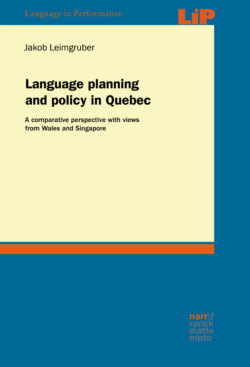Читать книгу Language planning and policy in Quebec - Jakob Leimgruber - Страница 12
На сайте Литреса книга снята с продажи.
1.2.2 Quebec English
ОглавлениеThe status and form of the English language as used in Quebec will be described in more detail in section 2.3.3. At this stage, it is worth pointing out that English has a long history in the province, having been spoken by colonists settling in and transiting through Quebec roughly at the same time as or very slightly after the establishment of the first French settlements. In the seventeenth and early eighteenth centuries, the British colonial presence in North America became increasingly important, soon outnumbering that of New France at the continental level. After the Conquest of 1760, the British secured a long-lasting presence throughout what is now Quebec, even if the actual numbers of Anglophones never overtook that of the Francophones. The balance shifted in some areas, however, particularly with the arrival of United Empire loyalists, political refugees from the newly independent American colonies who wished to remain under British rule. Many relocated to western Quebec and eastern Ontario. Subsequent waves of immigration, both from the USA and from the British Isles, further bolstered the anglophone population in Canada, including, as a minority language, in Quebec (mostly in the cities of Montreal and Québec).1
The kind of English spoken in Quebec today is a type of Canadian English very close indeed to general varieties of English in the country. Some scholars (Fee, 2008; Boberg, 2012) postulate the existence of a variety ‘Quebec English’, whereas others (Poplack, 2008; Poplack et al., 2006) refute its independent status. Larger works on world Englishes typically do not consider it distinctive enough to be listed, unlike, for instance, Newfoundland English (see Wells 1982; Kortmann and Schneider 2004, which have Canadian English and Newfoundland English; Kortmann and Lunkenheimer 2013 only has Newfoundland English). The minority status of English in the province has resulted in a number of features influenced by the presence of French (see section 2.3.3 for a more detailed description): most are at the lexical level (such as cégep [se(ɪ)ʒɛp] ‘senior high school’), other are phonological (lack of ‘Canadian Raising’), other grammatical (the verb to pass meaning ‘to pop/pass by’). It should be noted that Quebec English is not uniform, with regional varieties (Boberg and Hotton, 2015) as well as ethnic and social varieties (Boberg, 2004a; Boberg, 2014) in existence. Neither are most of the linguistic features found in Quebec unique to the province (Halford, 2003; Boberg, 2004b; Boberg, 2008; Labov et al., 2006; Chambers, 2006; Dollinger and Clarke, 2012a). Nonetheless, a certain Quebec flavour, primarily in the use of loanwords, can be detected even in the standard English used in newspapers in the province, such as in the following excerpt:
If transit agencies had followed the law, most métro and train stations would be accessible by now, say the lawyers representing people who rely on wheelchairs to get around.
‘The Quebec charter (of Human Rights and Freedoms) went into effect in 1975, so all the stations built after that point should be accessible to everyone’, said Gilles Gareau, the lawyer representing the Regroupement des activistes pour l’inclusion au Québec (RAPLIQ). The group was in Quebec Superior Court Wednesday and Thursday requesting permission to launch a class-action suit against the Société de transport de Montréal, the Agence métropolitaine de transport and the city of Montreal.
(‘Inaccessible métro stations violate charter of rights, hearing told’, Montreal Gazette, 2017-04-20 (Magder, 2017))
Note the loanword métro, spelled with the otherwise non-English ⟨é⟩, as well as the French names of the advocacy group and the transit agencies. These are official names that only exist in French, so any translation would be non-authoritative. By contrast, the charter is given its English title: legislation passed by the provincial National Assembly always comes in two equally authoritative versions in French and English, making the newspaper’s choice fully acceptable.
The long-standing presence of Anglophones in the province has given rise to a separate ethnolinguistic group, typically called ‘Anglophones’ or ‘Anglo-Quebecers’. Originally, certainly in Montreal, this group was in a position of social advantage vis-à-vis the Francophones, with the Anglophones over-represented on the upper echelons of the social ladder. Nowadays, in part due to a series of legal provisions enacted in the wake of the Quiet Revolution of the 1970s (see section 2.3 for more detail), the playing field has been levelled somewhat. Similarly, particularly in the urban context of Montreal, the boundaries between ethnolinguistic groups have blurred, and the equation of English as a mother tongue with membership of the Anglophone ‘community’ is no longer as straightforward as it may have been. The French language is, nowadays, spoken (in various shapes) by most of the ‘Anglophone’ youth, and, likewise, the English language is all but uncommon among Francophones. The vitality of the traditional Anglophone community has suffered some loss in the wake of the language legislation introduced in 1977, with many leaving the province for nearby Ontario and elsewhere in English Canada (Levine, 1990): the proportion of Quebecers with English as their mother tongue dropped from 13.8 % in 1951 to 7.6 % in 2011. By contrast, the decline of English as a ‘home language’ has been less drastic, going from 14.5 % in 1971 to 11 % in 2011, similarly to its use as the ‘first official language spoken’ (16.5 % in 1971 to 13.5 % in 2011). This can be explained by the contribution to the English-using population on the part of immigrants speakers of third languages (so-called ‘Allophones’): while the legislation introduced in 1977 made sure many would converge towards French, not all did – in Montreal, traditionally the destination of much of Quebec’s international immigration, almost a quarter of the population had English as their sole first official language in 2011.
